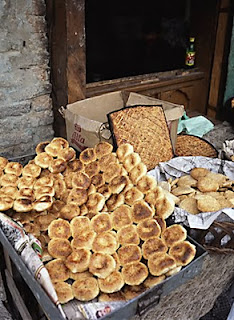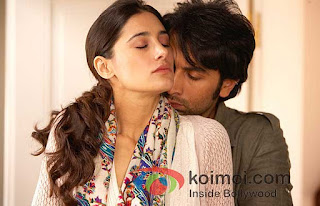Dear All,
First and foremost I want to thank all of you for reading and appreciating by previous post on Kashmir and Kashmiri's. I had it written long time back but never found the necessary confidence to post it. I always though "who would be interested in reading all this". But your comments and appreciation proved me wrong and I am so happy about it. It has given me the necessary confidence to post what I had written in continuation of what I posted earlier!
Please read on to know more details about us, Kashmiri pandits ...
LIFESTYLE.
Like everyone else Kashmiri families today are mostly nuclear in nature. Kids grow up, go to different places and it’s the mother-father that are left alone in the homes. This is the scenario that I see around. In the old days there were joint families, bunch of children, lot of fun and lot of action. Not anymore!
The basic lifestyle these days is similar to like anybody else. We eat, pray, sleep, watch TV …. Nothing unusual. Yea, a lot of stress is given to education. Girls, boys are treated alike in matters of education and otherwise [I am strictly talking about what I see around in my family and those of my relatives!]. Even in the old days importance to education was given for the girl child. The girls in our community are married off only when they have finished studying and are independent (financially, I mean). There is no hard and fast rule but yea girls are not married off young. But otherwise the restrictions are the same (in India
RITUALS.
This is very vast. There are so many things under this. Festivals. Birthdays. Marriages. And what not.I will try my best to explain it all to the best of my ability.
I will start with birthdays. We kashmiri’s have 2 birthdays a year. Shocked? Well, most of the people are! Okie let me elaborate. One is the normal kind of birthday which everyone has and knows about. Like mine is on 9th of feb. The other birthday is based on the lunar calendar and it changes every year. Just like diwali does not fall on a same date every year. We differentiate between the two by calling one angreiz (English) and the other kashur (kashmiri). The Kashmiri birthday is celebrated by a small pooja. Yellow rice is made, you tie a red coloured thread on your wrist and put a tilak. A myriad of kashmiri dishes are made (both veg and non veg). The other birthday is celebrated in the usual manner cake, party etc. you can even cut a cake on your Kashmiri birthday (in addition to the pooja), no worries, no rules.
Most important festival in our calendar is SHIVRATRI as we are Shiv devotees. It comprises of a 4-5 hour pooja called the vatak pooza. This is done by all Kashmiri families. However the intricacies may differ. For example, we make 5 vegetarian dishes on this day to offer the deity, others may make some other dishes, some families also make non-veg food. The next day of the pooja is known as salaam. On this day most of the families make non-veg food. Though some eat veg on this day as well. One of my relatives don’t touch, eat, look at non-veg food for some good 5,6 days prior to Shivratri. They can eat non-veg only after salaam.
Being Hindus we celebrate other festivals with equal amount of zest and enthusiasm. Other common festivals are celebrated in the same way as everyone else with maybe a minor difference here and there.
Though majorly we are Shiv bhakts, Kashmir has it’s own history of saints. I will mention those I know of. There is Mata Kheer Bhawani (also known as tulmul) temple in Kashmir . A replica of it has also been made in Jammu Jammu
Marriages are very important affairs. The preparations of which is started year before the actual occasion. And many a small events commemorate its starting. Like bengali’s we too are rice lovers, so when we buy rice, it is also a function called the toomul saatun, in which the aunties of the family come together to clean up the rice and have a hearty meal. All the things related to marriage like masalas (spices), jewellery, clothes etc are bought on auspicious days, the day should be shub.
I my family we have a lot of girls,especially on maternal side. So most of the weddings I have witnessed have been of girls. Hence I will write about the wedding from the girl’s side. The main events are the Mehandi Raat, Devgon and Baarat. Apart from these sure-shot events there can be optional events like satsang, cocktail parties, reception etc etc.
So, the mehandi-raat includes a lot of mehandi, a lot of traditional foot tapping kashmiri music (a kashmiri music party is called for the occasion), whole-lot of nach gaanna and traditional kashmiri food (veg or non-veg, totally optional). In short a very colourful night and the most anticipated function of the shaadi !
Devgon is basically a pooja, where the girl enters the womanhood. It involves kaane shraan, wearing new clothes (supplied by maternal relatives), wearing some of the jewellery and performing a mini-havan with help of a pandit ji.
The main event of shaadi includes the welcome of the groom’s side (by putting garlands around them!) varmaalla exchange by the couple, a lot of photographs, more food (mostly this event has vegetarian food). The shaadi does not necessarily take place during the day (as is perceived by many) it can also take place during the night. The event of shaadi includes a lot of things, bride and groom are made to make different poses holding hands, etc etc . No. not for the photographs! They mean some thing. Also the kanyadaan of the bride. I love this part, where the bride sits in her fathers lap! The couple is taught the meaning of marriage by the pandit. Then comes the vidai part, where the ladies (and some gents) cry to their heart’s content.
Next in line is the event of satrat the night immediately after the wedding (for example, if the vidai was in the morning, satarat will be in the night of the same day), where the bride and groom come as a married couple and non veg food is cooked. Then reception may-or-may not follow. That more or less ends the marraige function.
MUSIC AND HANDICRAFTS
Kashmiri music is really popular amongst the older generation like my mom, grandmom etc. As far as my knowledge is concerned I feel the impact of kashmiri music on younger generation (including me) is non-existant. My knowledge of it is limited to few famous folk songs which are usually played out in parties and marriages.
CUISINE
I have no patience whatsoever to talk about this vast and mouth-watering topic, so I will just let the pics do all the talking:


















